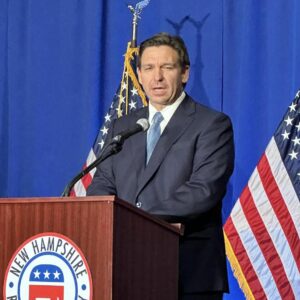Political observers eager for four more years of Donald Trump scandal stories have quickly dismissed the prospects of Florida governor Ron DeSantis since he officially entered the contest for the Republican presidential nomination two months ago.
Recent polls, both national and from early primary states, show DeSantis trailing the former president by double digits, and a staff shakeup within the DeSantis campaign has driven speculation among donors that DeSantis is struggling. His critics even pointed to a DeSantis motorcade fender-bender as evidence that his campaign lacked momentum.
The great DeSantis pile-on has been going on since the governor won re-election by a landslide last year and became the presumptive candidate to beat for the GOP nomination.
It’s pretty tricky to write DeSantis’ obituary before the race officially starts, but that’s what Trump’s allies appear to be trying to do.
It’s not that national polls in a primary contest don’t matter. It’s just that they don’t matter much. Data on where the conservative base of the Grand Old Party stands compared to donors is interesting, and it’s certainly a warning that the populist wing and the party elites aren’t fully aligned. But that’s not breaking news, and it’s not a determining factor in a nominating contest that’s decided at the state level.
Trump may still have an iron grip on the populist base of the Republican Party, but he’s not invincible –– and he knows it.
The Republican presidential primary is a complex and drawn-out process of barnstorming early states to woo GOP voters and delegates until one candidate has enough support to earn the nomination at next summer’s convention in Milwaukee. The process can be chaotic, but it’s designed to allow a broad field of hopefuls to make their pitch to Republican voters, avoiding an undemocratic coronation by party insiders.
Trump and his allies know –– and the latest campaign finance reports confirm –– that he doesn’t have the resources for a protracted primary fight. Trump needs to end challenges to his primacy over the GOP quickly.
According to the media’s analysis of campaign finance disclosures, Trump’s network of political committees has paid $60 million in legal fees since he lost the 2020 election. Trump may dominate the primary field today, but he’s bleeding cash at an unsustainable rate, and his legal troubles are not going away anytime soon. The longer the primary drags on, the weaker the former president becomes.
DeSantis and his campaign committees are by far the frontrunners in the dash for cash, with nearly $120 million in the bank. The Trump campaign has about half that amount between his fund-raising committees and super PAC. South Carolina Sen. Tim Scott is in third place with $40 million.
As far as the polls go, Iowa’s January 15 presidential caucus is the first real test of the nomination battle, and Trump’s showing in polls in the Hawkeye State differs from his performance in national surveys.
A recent New York Times/Siena College survey of the Iowa caucus highlights Trump’s weakness at the state level. While he leads DeSantis 43 percent to 20 percent with likely caucus-goers, he’s still below 50 percent. With nearly five months before the Iowa caucus, there’s time — though not a lot — for Trump’s challengers to close that gap.
A win in Iowa for Trump would undoubtedly be a significant blow to DeSantis and the rest of the field of hopefuls. But Trump’s support is softer than the oft-quoted 37-percent floor. The base is with him, but even the most hardcore conservatives are leaving the door cracked to other options. However, those voters can’t be expected to jump ship until they know they have a winning alternative. And that’s where the primary process comes in. The base likes the former president but also wants to start winning again. The other challengers must demonstrate to voters during the primary season that they can deliver on that promise.
A consensus alternative to Trump may not have emerged, but DeSantis is the closest out of the pack of hopefuls. He is the only candidate polling in double digits. His favorability has remained consistent despite daily attacks from Trump; the next most popular candidate is Scott, who has yet to break the 10 percent ceiling.
If the determining factor is electability next November — and I would argue it is — then DeSantis is the clear choice for GOP voters.
DeSantis is promising to put Republicans back in a position to lead the country out of the swamp of the Biden administration. The new economic independence plan that DeSantis rolled out last week shows he wants to move the nation forward and get back to the things that matter most to American voters.




